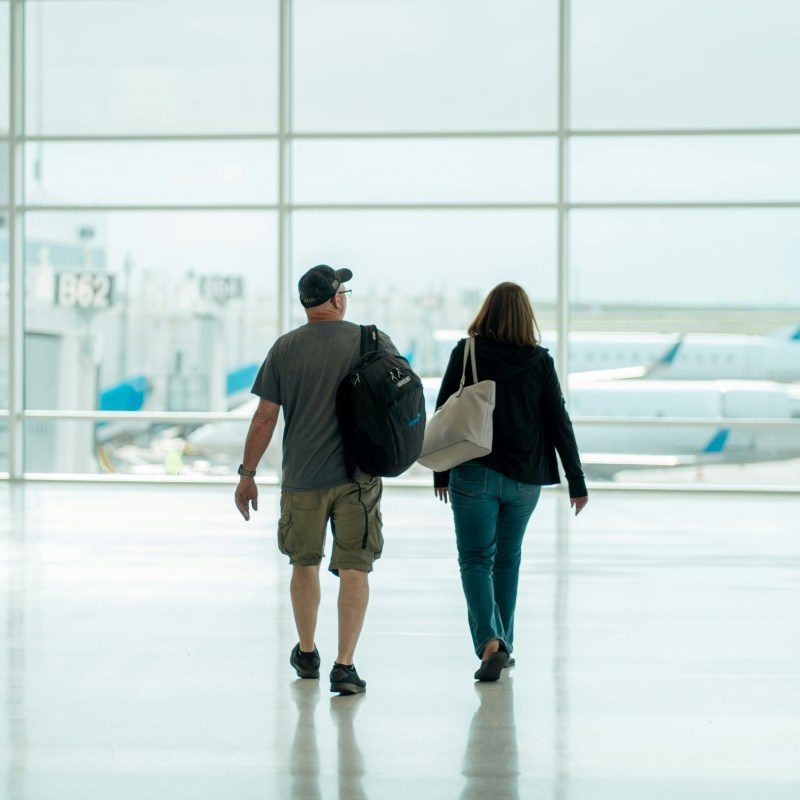
Americans have new rights when it comes to receiving compensation for delayed and disrupted flights.
Videos by TravelAwaits
The US Department of Transportation recently passed a new regulation that outlines how and when airlines must reimburse you for disrupted air travel.
It’s called Fly Rights: A Consumer Guide to Air Travel.
The guide includes all kinds of helpful information about how airlines work and what Americans should expect from a journey to the airport, domestic flights, and international flights.
(I didn’t realize that overbooking flights is actually perfectly legal… thank you, Fly Rights.)
But let’s cut straight to the good stuff: Money.
The goal of the Fly Rights regulation is to financially protect Americans from disrupted and delayed flights. Thanks to a new finalization related to reimbursement, the rules work in a flyer’s favor now. You should be automatically reimbursed.
Sounds too good to be true?
It’s not. Here’s how to get compensated for delayed and canceled flights according to the new Fly Rights regulation.
When are passengers owed compensation?
Airlines aren’t always responsible for delays and disruptions. Just because your flight is canceled or delayed, that doesn’t mean you automatically qualify for compensation.
The new Fly Rights compensation policies are applicable only when an airline is at fault.
You are not owed compensation for issues stemming from these problem:
- Poor weather
- Air traffic control under-staffing
- Mechanical issues
But you are owed compensation when an airline contributes to delays, cancellations, and disruptions in these ways:
- Canceled flights
- Significantly delayed flights
- Significantly delayed checked luggage return
- Failure to provide paid add-ons, like extra legroom
How to get compensated for canceled flights
When your flight is canceled, airlines can offer you an alternative form of transportation or travel credits. You can accept these offers—and it’s recommended you do so if you’re traveling under time restraints.
But you will not receive financial compensation if you accept an alternative form of travel or travel credits.
If you do not accept these forms of compensation, then you are automatically going to be refunded for the total that you paid for your flight.
The refund will be applied to your original form of payment within seven business days for credit cards or 20 business days for other forms of payment.
How to get compensated for significantly delayed flights
According to the Fly Rights program, a significant delay covers changes to domestic and international flights.
Here’s what counts as a ‘significant’ delay:
- Delays over three hours for domestic flights
- Delays over six hours for international flights
- Departures or arrivals from different airports
- Increases in the number of connections
- Downgrading passengers to a lower class
- Adding connections that don’t have adequate accessibility for passengers with disabilities
If your flight is delayed according to one of these definitions, then you will be compensated in the same way as you would for a canceled flight.
That means that airlines will automatically reimburse you within seven business days for payments made by credit card and up to 20 days for other payment methods.
How to get compensated for significantly delayed checked luggage return
To receive compensation for a delayed checked luggage return, passengers must file a mishandled baggage report with their airline.
After that, you are eligible for a full refund for your checked bag fee if the luggage is not delivered within 12 hours for domestic flights or up to 30 hours for international flights. Keep in mind that the international rules change according to how long the flight is – but 30 hours is the maximum time you would need to wait.
If you’re eligible for a refund, you’ll be automatically reimbursed according to your original payment method.
What about not receiving paid add-ons?
If an airline fails to provide you with a paid add-on like extra legroom, a specific seat selection, or Wi-Fi, then you will automatically be reimbursed for the full amount on your original payment method. I’m assuming that only happens if you’ve filed a complaint with the airline, similar to a missing luggage report.
